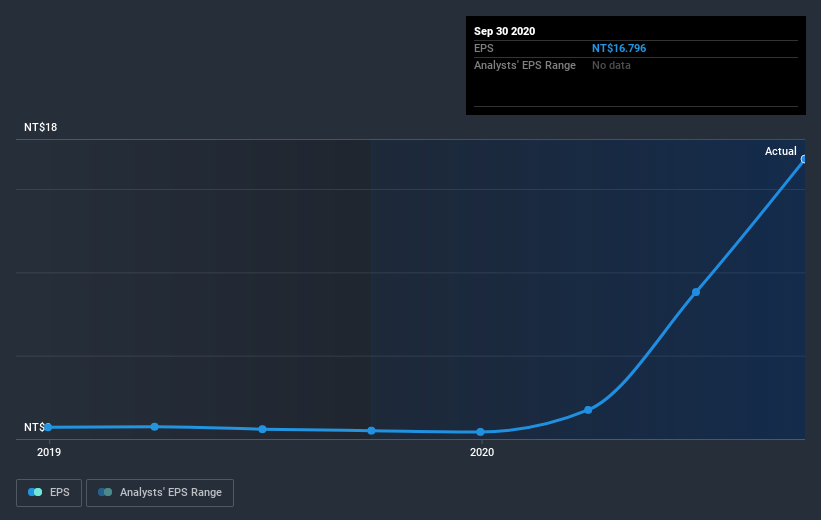Investors Who Bought Universal Incorporation (TPE:1325) Shares A Year Ago Are Now Up 543%

Some Universal Incorporation (TPE:1325) shareholders are probably rather concerned to see the share price fall 35% over the last three months. But that cannot eclipse the spectacular share price rise we've seen over the last twelve months. In that time, shareholders have had the pleasure of a 543% boost to the share price. Arguably, the recent fall is to be expected after such a strong rise. While winners often keep winning, it can pay to be cautious after a strong rise.
We love happy stories like this one. The company should be really proud of that performance!
View our latest analysis for Universal Incorporation
In his essay The Superinvestors of Graham-and-Doddsville Warren Buffett described how share prices do not always rationally reflect the value of a business. One way to examine how market sentiment has changed over time is to look at the interaction between a company's share price and its earnings per share (EPS).
During the last year Universal Incorporation saw its earnings per share (EPS) increase strongly. This remarkable growth rate may not be sustainable, but it is still impressive. So we're unsurprised to see the share price gaining ground. We're real advocates of letting inflection points like this guide our research as stock pickers.
The graphic below depicts how EPS has changed over time (unveil the exact values by clicking on the image).

This free interactive report on Universal Incorporation's earnings, revenue and cash flow is a great place to start, if you want to investigate the stock further.
A Different Perspective
It's nice to see that Universal Incorporation shareholders have received a total shareholder return of 544% over the last year. That's including the dividend. That's better than the annualised return of 38% over half a decade, implying that the company is doing better recently. In the best case scenario, this may hint at some real business momentum, implying that now could be a great time to delve deeper. I find it very interesting to look at share price over the long term as a proxy for business performance. But to truly gain insight, we need to consider other information, too. Consider for instance, the ever-present spectre of investment risk. We've identified 1 warning sign with Universal Incorporation , and understanding them should be part of your investment process.
Of course Universal Incorporation may not be the best stock to buy. So you may wish to see this free collection of growth stocks.
Please note, the market returns quoted in this article reflect the market weighted average returns of stocks that currently trade on TW exchanges.
When trading Universal Incorporation or any other investment, use the platform considered by many to be the Professional's Gateway to the Worlds Market, Interactive Brokers. You get the lowest-cost* trading on stocks, options, futures, forex, bonds and funds worldwide from a single integrated account. Promoted
New: AI Stock Screener & Alerts
Our new AI Stock Screener scans the market every day to uncover opportunities.
• Dividend Powerhouses (3%+ Yield)
• Undervalued Small Caps with Insider Buying
• High growth Tech and AI Companies
Or build your own from over 50 metrics.
This article by Simply Wall St is general in nature. It does not constitute a recommendation to buy or sell any stock, and does not take account of your objectives, or your financial situation. We aim to bring you long-term focused analysis driven by fundamental data. Note that our analysis may not factor in the latest price-sensitive company announcements or qualitative material. Simply Wall St has no position in any stocks mentioned.
*Interactive Brokers Rated Lowest Cost Broker by StockBrokers.com Annual Online Review 2020
Have feedback on this article? Concerned about the content? Get in touch with us directly. Alternatively, email editorial-team@simplywallst.com.
About TWSE:1325
Universal Incorporation
Manufactures and sells nonwoven fabrics in the United States, Asia, and Europe.
Flawless balance sheet very low.
Similar Companies
Market Insights
Community Narratives


